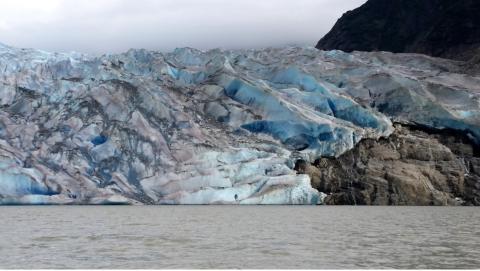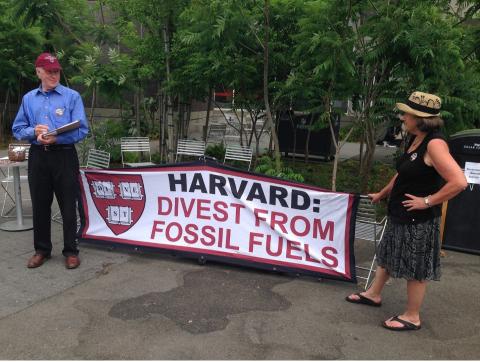Warrior Lawyer Profile: Kelsey Skaggs

Jianna Faner
Allard JD Candidate 2023
Jun 20, 2022
The Climate Movement Needs Lawyers
Kelsey Skaggs has an impressive list of accolades for any person, let alone someone so young. She is the co-founder and Executive Director of Climate Defense Project, an organization of lawyers supporting frontline climate activists. She has been recognized through the Echoing Green Climate fellowship, the Straubel Leadership Award, the Civil Society fellowship, the Harvard Law School Public Service Venture Fund Seed Grant, and a place on the Forbes 30 Under 30 list. It was also not too long ago that Skaggs—while still only in her second year at Harvard Law School—sued Harvard to compel fossil fuel divestment.
Not far from where Skaggs grew up, the Mendenhall Glacier is receding—rapidly.

The permafrost which holds Alaska together is melting, causing the collapse of mountains, the threat of tsunamis and the “slow-motion” disaster of thermokarst sinkholes.
As for the fish and fishing that are Alaska’s lifeblood, some summers are now so dry that salmon can no longer swim upstream to where they need to spawn.
As part of her 2021 talk for the Centre for Law and the Environment’s No Fly Zone speaker series, Skaggs shared that she went to law school figuring that she would find a way to work on the legal dimensions of climate change. However, she learned that environmental law in the United States (like in Canada) is administrative law. Through the current framework of environmental law, administrative agencies are relied upon, not necessarily to protect the environment, but to issue permits to allow industry to engage in activities that are harmful to the environment.
Suing Harvard University
While she was learning about the current—and limited—state of environmental law in the United States, Skaggs was also experiencing the climate movement for the first time. She began to meet people who were organizing in their communities and finding ways to fight climate change in their communities.
On an episode of the podcast “Planet Potluck” with Grace Nosek (a Fellow at Allard’s Centre for Law and the Environment), Skaggs described her experience filing the first ever lawsuit—against Harvard University—to compel fossil fuel divestment, in collaboration with other students while only in her second year of law school.

At the time, Harvard was firmly against divestment and even talking openly about its investments. The divestment activists at Harvard—part of the larger worldwide movement to get schools and other institutions to divest from fossil fuels—tried writing letters, starting petitions, hosting rallies and doing acts of civil disobedience, but Harvard simply would not engage. Frustrated, Skaggs and two other students turned to the courts.
Their lawsuit argued that the university was violating its fiduciary duties to its students, who are supposed to benefit from the way that the endowment is run. Ultimately, on October 6, 2016, the Massachusetts Appeals Court upheld the Superior Court’s decision to dismiss the suit, ruling that the plaintiffs failed to show that they had standing, and declining to allow the plaintiffs to assert the rights of future generations and declining to recognized the proposed new tort of “intentional investment in abnormally dangerous activities”.
However, despite the setback in the courts, the Divest Harvard campaign ultimately won a victory in September 2021, when Harvard announced that it was divesting from fossil fuels. The announcement sounded a lot like the argument made by Skaggs and her colleagues in their lawsuit: “Given the need to decarbonize the economy and our responsibility as fiduciaries to make long-term investment decisions that support our teaching and research mission, we do not believe such investments are prudent.”
The Climate Defense Project and the defence of necessity
Through the people she met and her experience in the climate movement, Skaggs learned about a particular unmet need of climate activists: lawyers. Thus, the Climate Defense Project was created to provide legal support to the climate movement and to people and communities defending themselves against climate change.
The clients of the Climate Defense Project proactively use the legal process to further the goals of their campaign and their movement, thinking about their potential criminal trials before engaging in protest action. Such trials offer a legitimizing platform, a structure for presenting facts and telling a story, an opportunity to exercise democracy (by allowing jurors to weigh in on important issues in their community), and a way to shift the law and achieve results that the other branches of governments cannot.
One way the Climate Defense Project helps activists pursue the advantages of political trials is through the necessity defence, according to which an activist can argue that it was necessary to break the law they are accused of violating.
In her talk at the Centre for Law and the Environment, Skaggs explained:
Skaggs’s imaginative use of the law, responsive to the needs of activists and cognizant of the current limitations of the legal system, is a true mark of a warrior lawyer.
Even before the Climate Defense Project and the necessity defence, not many second year law students would be so bold as to sue their own university, let alone Harvard, one of world’s wealthiest and most respected centres of higher learning.
As a true warrior lawyer—not to mention, one so young—Skaggs seeks out creative solutions to challenging problems, but she also shows others that there’s no need to be perfect or to have all the answers: a warrior lawyer just needs to start. While on the Planet Potluck podcast, Skaggs offered this wisdom: “The thing about climate change is that we can’t wait: we can’t wait until we’re perfect lawyers until we take action against it.”
- Centre for Law and the Environment


